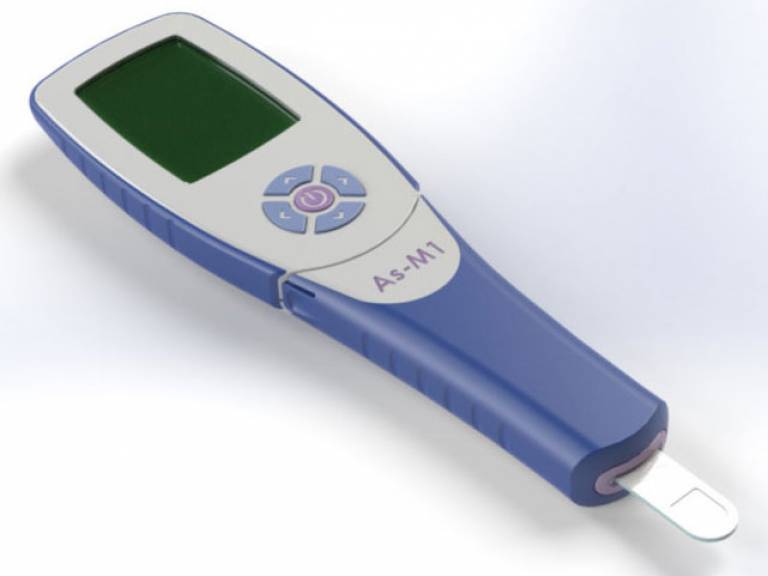创新背景
根据世界卫生组织的数据,全世界有1.4亿人饮用含有不安全水平砷的水。孟加拉国是受影响最严重的国家之一,在孟加拉国的一个地区,大约20%的死亡可归因于砷中毒。目前对砷的检测要么是由科学家在实验室进行,要么是使用能产生有毒化学物质的化学测试包,最多需要半个小时才能得出结果。
创新过程
伦敦大学学院和帝国理工学院开发了一种小型、灵敏和精确的传感器,可以立即测量水中的砷水平,每次检测的成本不到1美元。这使得它适合在低收入和中等收入国家的农村地区的多个地点进行测试,这些国家的饮用水受污染的砷中毒问题最大,并有可能拯救生命。

伦敦大学学院结构与分子生物学的微生物学读者Joanne Santini博士在发现一种以砷为食的微生物后,萌生了开发一种传感器来检测水中砷的想法。
英国皇家科学与研究委员会的后续资助和一名CASE学生让桑蒂尼博士和伦敦帝国理工学院的化学生物学教授托尼·卡斯(Tony Cass)得以开始研究砷传感器。托尼的工作导致了第一台电子血糖监测器的开发。
开发商业想法和支持衍生品对政府的工业战略和生物纳米咨询至关重要,该公司是伦敦大学学院和帝国理工学院的衍生品,已经为传感器设计申请了专利,并利用英国创新协会颁发的智能奖,创建了一个原型,可以分批生产多达100个。

大学和科学部长Sam Gyimah表示,这种检测水污染有害水平的传感器将在发展中国家产生巨大影响,可能拯救数百万人的生命。太多的人暴露在危险水平的砷中,这一产品清楚地展示了我们的工业战略在行动,创造明天的技术,支持高价值、高技能的工作,这将使英国适应未来。生物纳米咨询公司的首席执行官大卫·萨菲博士表示,水中的砷污染是一个非常重要的问题,但目前还没有技术能够妥善解决这个问题。
这种新型传感器类似于糖尿病患者使用的血糖仪。一旦一滴水滴到插入传感器的测试条上,它就会在一分钟内产生砷水平的数字读数。这将使低收入和中等收入国家农村地区的当地人民能够使用这种方法,在这些国家,砷中毒问题最严重,获得保健和技术的途径有限。
创新价值
它适合在低收入和中等收入国家的农村地区的多个地点进行测试,这些国家的饮用水受污染的砷中毒问题最大,它有可能拯救生命。
创新关键点
这种新型传感器类似于糖尿病患者使用的血糖仪。一旦一滴水滴到插入传感器的测试条上,它就会在一分钟内产生砷水平的数字读数。
创新主体
伦敦大学学院(University College London,简称:UCL ),1826年创立于英国伦敦,是一所公立研究型大学,为伦敦大学联盟的创校学院、罗素大学集团和欧洲研究型大学联盟创始成员,被誉为金三角名校和“G5超级精英大学”之一。
帝国理工学院(英文:Imperial College London),是一所主攻理学、工学、医学和商学的研究型大学,全称为帝国科学、技术与医学学院(Imperial College of Science, Technology and Medicine)。帝国理工学院是具有创新力的大学之一,尤其以工程专业而著名。
Innovative development of arsenic sensor for drinking water detection
University College London and Imperial College London have developed a small, sensitive and accurate sensor that can instantly measure arsenic levels in water at a cost of less than $1 per test. This makes it suitable for testing in multiple locations in rural areas of low - and middle-income countries, where arsenic poisoning from contaminated drinking water is the greatest problem and potentially life-saving.
Dr Joanne Santini, reader in Microbiology in Structural and Molecular Biology at University College London, came up with the idea of developing a sensor to detect arsenic in water after discovering a microbe that feeds on arsenic.
A follow-up grant from the Royal Council of Science and Research and a CASE student allowed Dr. Santini and Tony Cass, a professor of chemical biology at Imperial College London, to begin work on arsenic sensors. Tony's work led to the development of the first electronic glucose monitor.
Development business idea and support the derivatives of the government's industrial strategy and biological nanometer consulting is crucial, the company is at university college London and the derivatives of imperial college, has applied for patents, designs for the sensor and intelligent award issued by the association of British innovation, created a prototype, can batch production up to 100.
Universities and Science Minister Sam Gyimah said the sensors, which detect harmful levels of water pollution, would have a huge impact in developing countries and could save millions of lives. Too many people are exposed to dangerous levels of arsenic and this product is a clear demonstration of our industrial strategy in action, creating the technologies of tomorrow and supporting the high-value, high-skilled jobs that will make Britain fit for the future. Arsenic contamination in water is a very important problem, but there is currently no technology that can properly address it, according to Dr David Safi, chief executive of Biononavision.
The new sensors are similar to those used by diabetics. Once a drop of water hits the test strip inserted into the sensor, it produces a digital reading of arsenic levels within a minute. This will enable local people in rural areas of low - and middle-income countries, where arsenic poisoning is most problematic and access to health care and technology is limited, to use the method.
智能推荐
从沸石反应中发现可将残余甲烷转化为甲醇的方式
2022-08-14从沸石自然反应中发现“笼效应”,仿生研究甲烷羟基化的机制。
涉及学科涉及领域研究方向新能源 | 利用铁、碳和氢创新融合帮助氢燃料电池降低成本
2022-06-29利用已有廉价易得元素进行分离式单原子金属转化合成生产新型化学催化剂。
涉及学科涉及领域研究方向化学合成非织造布抗菌纺织品
2022-06-29创新使用射频气体放电等离子体技术开发新技术,改善非织造布材料性能,增加其抗菌作用。
涉及学科涉及领域研究方向利用新方法创造特殊单原子催化剂
2022-08-16能源部SLAC国家加速器实验室和斯坦福大学的科学家的一项新研究:将单个铱原子锚定在催化剂表面将水分子分裂的效率大幅度提高。
涉及学科涉及领域研究方向